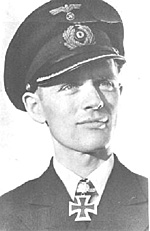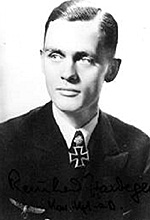
This is the interview we did in 1994 with Korvettenkapitän REINHARD HARDEGEN (102-LIFE-1985). You may own a copy of this videotape – details at the end of this article.
SHARKHUNTERS: Captain Hardegen, you had wanted to be an aviator, I understand, and somehow you came to be in the submarine corps. How did that happen?
CAPTAIN HARDEGEN: I entered the navy in 1935, ordered to go to the naval air force and after the Polish War, I was ordered to go to submarines.
SHARKHUNTERS: So, as a soldier, you got your orders and you went?
CAPTAIN HARDEGEN: Yes, yes. I had to obey.
SHARKHUNTERS: Captain Hardegen, please tell us about your first mission, Operation Paukenschlag – when you got your orders, and when you came to the United States, can you tell us how you found it – how you found the conditions and the country?
CAPTAIN HARDEGEN: When I came the first time to the United States, I was off New York and I saw Long Island, the coast and I saw all the lights, motorcars and so on and I thought it would be a big surprise for the United States because I didn’t know that the English already cracked our naval cipher and informed Admiral Ernest King. He is a man I thank to be alive today because he was such a bad admiral that he didn’t do anything and it was not a surprise. The English gave him, every day, my position and he knew what direction I came, but he did nothing. He had twenty-five destroyers in the port and he let them in the port, and all the lights were on, the lightships, no dimming, no blackout and so on. It was fascinating.
SHARKHUNTERS: So you could use the same navigational markers that the American shipping was using.
CAPTAIN HARDEGEN: Yes, yes. But you see, I didn’t see the skyscrapers of New York – this is wrong. Sometimes in the American press it tells that I saw the people dancing on the roof of the Waldorf Astoria. That’s nonsense. I didn’t pass the Narrows and so I saw only the glow of the lights of New York in the sky. That was all. I saw the coast of Long Island.
SHARKHUNTERS: When you were coming down the coast of Long Island, were you able with your binoculars – could you see the amusement park at Coney Island?
CAPTAIN HARDEGEN: I saw it by my eyes! I was so near to the coast, I could see all.
SHARKHUNTERS: This must have been very surprising for you. I mean, here you are…..the battle with the British had become very difficult and here you are on the coast of the United State with your own eyes, you can see the cars driving, you can see the amusement park. What were you thinking at that time?
CAPTAIN HARDEGEN: Oh, I don’t know what I was thinking. It was a long time ago. I waited for ships coming out from the harbor of New York and when the first ship, the tanker NORNESS came, I followed him until the water was deep enough and so I torpedoed her.
SHARKHUNTERS: Then you moved on further south, off the coast of Virginia and North Carolina. In close to shore the water is fairly shallow. Can you tell me about the difficulties of operating a submarine in shallow water?
CAPTAIN HARDEGEN: It was difficult because I was not able to dive, but near the coast there are more ships than outside. If I had known before that Admiral King knew that I would come, I would never be so near the shore. I would be on the 200 meter line or something like that – but there, there are no ships.
SHARKHUNTERS: I’ve heard it described, about the waters on the east coast, that the plankton would be phosphorescent and when a ship would move through them, they would glow and leave a glowing trail. Did you see that?
EDITOR NOTE – They are called pyrophotoplankton and they do indeed, glow when disturbed in any way. However, they are in clusters and not all over the water so the submarine chances possibly hitting one of these clusters; possibly not.
CAPTAIN HARDEGEN: I don’t remember. Maybe sometimes, but nothing special.
SHARKHUNTERS: U-123 is renowned for sinking a large number of ships by deck gun; by cannon.
CAPTAIN HARDEGEN: Yes, five ships.
SHARKHUNTERS: Can you tell us something about what it is like to engage a ship with cannon – what problems the gun crew had to do?
CAPTAIN HARDEGEN: I followed the ship because I knew that they only had the lookout in front and not astern. Then my gun crew was on deck and in the last moment, I went to the portside and then we opened fire – and we sank five ships by gun.
SHARKHUNTERS: Was there any rivalry between the men who worked the torpedo rooms versus the men who worked the deck gun? Was there a rivalry of any kind?
CAPTAIN HARDEGEN: No. They were very often the same people. The gun crew is not only special for the gun crew. They had also other things. I had not only soldiers for the guns.
SHARKHUNTERS: Off the coast of Florida, you sank a tanker very close to the shore and we understand that you began to shell the tanker then you saw people coming out along the shore and you were afraid that one of your shells would miss and hit the shore. Can you tell us about that?

CAPTAIN HARDEGEN: That was the GULF AMERICA off St. Augustine. I torpedoed her and then I want to shell her but I didn’t start shelling her because the ship was between the coast and me and so I went around the ship and shelled from the shore out to sea so that no shell can hit innocent people ashore. It was a little bit dangerous for me because my ship was silhouetted against the burning tanker and I didn’t know exactly if there were guns ashore. I saw a lot of motorcars and I saw the hotels. Three or fours years ago, I was in St. Augustine and I said to the Lord Mayor that he must invite me for some weeks every year because in 1942, it was a big spectacle for his town, and all the people came looking at the burning tanker and they were drinking, I guess beer, and eating and so he made a good business – and now the sunken ship is full of barnacles and all the divers come and look for souvenirs on the sunken tanker GULF AMERICA and so here is another big business for the town. Naturally, we were laughing and he said that I was right; it was big business.
SHARKHUNTERS: Probably the biggest event that has happened in that town.
EDITOR NOTE – Not far from that spot, off Ponte Vedra Beach, U-584 dropped off four saboteurs in June 1942 as part of Operation PASTORIUS. The biggest crime problem they have in that town is people stealing the memorial marker when the four men came ashore.
Captain HARDEGEN: Yes.
SHARKHUNTERS: Later that evening, you had a very, very close encounter where you were caught by an American destroyer that severely damaged your vessel. Please tell us about that.
 U-123 returning to Lorient after a successful Operation PAUKENSCHLAG
U-123 returning to Lorient after a successful Operation PAUKENSCHLAG
Capt. HARDEGEN: Yes, there came a destroyer – I forget its name, and it was shallow water and I was aground in about 20 or 25 meters, and he attacked us with three depth charges. We had a lot of trouble on board and we wanted to escape from our boat but he didn’t drop more depth charges and I later learned that he thought we were already sunk because we lost a lot of fuel and we lost pressed air and there was also debris because we lost some wood off our deck and so he thought that he sunk the submarine and didn’t drop any more depth charges. When I was in St. Augustine, there was a man who said ‘I have a thing off your boat’. I asked him, and he said that he heard by radio that a submarine was sunk and he went out by motorboat and he saw fuel, a spot of fuel, and some debris that was wood from my deck and he had it at home. That was very interesting for me.
SHARKHUNTERS: You came very close to abandoning your ship that evening. Please tell us why you were about top abandon the ship and then, why you decided not to?
Capt. HARDEGEN: You see, I wanted to abandon the ship and first, the commander has first to open the hatch but I heard the screws of the destroyer and I thought ‘Let’s me wait some minutes’ because when he would drop more depth charges, I would be dead at once and then the destroyer went over and no depth charge came and this was about three times and as I tried to open the hatch, the destroyer came once more. And then it was, he went off and so he stopped.
SHARKHUNTERS: What is it like to be in a submarine during a depth charge?
Capt. HARDEGEN: What is it like? We hear the noise of the depth charges and the lights have gone off and all the things – we had water in the boat and…..WE HAD A LOT OF WORK! A lot of things to do.
SHARKHUNTERS: One of the things I think is most interesting is that the people in America most admire about the U-Boat veterans is the camaraderie of the group - that everyone in the boat; that their life depended on the performance of each other person.
Capt. HARDEGEN: Yes.
SHARKHUNTERS: Tell us something about the camaraderie, the band of brothers that would make up the submarine? Captain HARDEGEN: Yes, a band of brothers – it was Nelson who said it and the camaraderie on board was very good because everyone works for each other and we have nearly every year, we are meeting together and in October, we had a meeting of U-124; I made two trips with U-124. there is very good connection.
EDITOR NOTE – Captain HARDEGEN twice rode U-124 as a commander in training, under WILHELM SCHULZ (162-+-1986), a Skipper who was well loved in the Kriegsmarine.
SHARKHUNTERS: We will soon be going to the U-Boat Memorial. Can you please tell us something about the Memorial?
Capt. HARDEGEN: It is a memorial for all comrades who died, and for every boat, there is a bronze plaque with the names of all, and there are more than thirty thousand names in the Memorial. It is very impressive, and there is an eagle on the top.
Reinhard Hardegan Part 2 [KTB 178]
Back to KTB # 177 Table of Contents
Back to KTB List of Issues
Back to MagWeb Master Magazine List
© Copyright 2004 by Harry Cooper, Sharkhunters International, Inc.
This article appears in MagWeb.com (Magazine Web) on the Internet World Wide Web. Other articles from military history and related magazines are available at http://www.magweb.com
Join Sharkhunters International, Inc.: PO Box 1539, Hernando, FL 34442, ph: 352-637-2917, fax: 352-637-6289, www.sharkhunters.com
